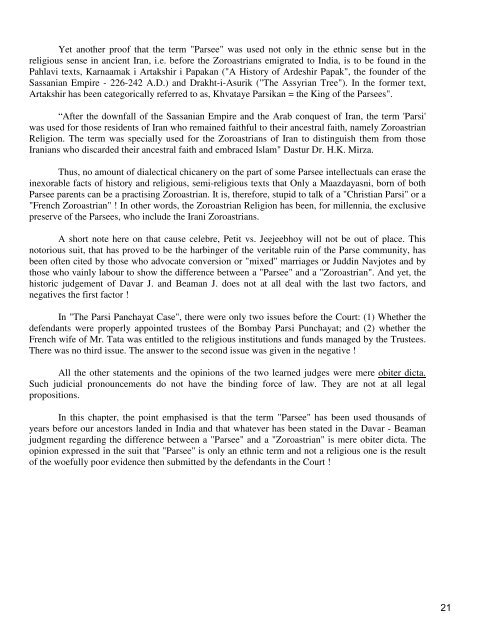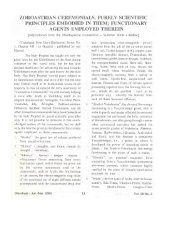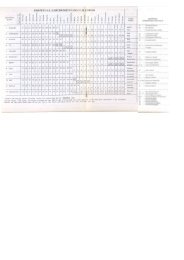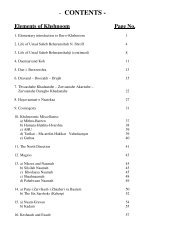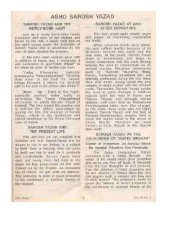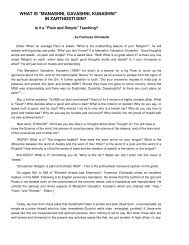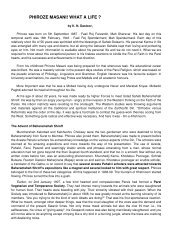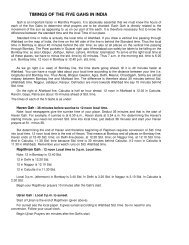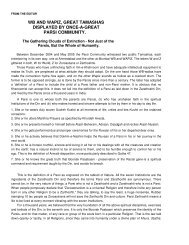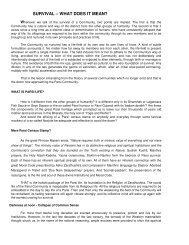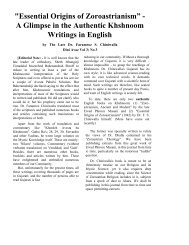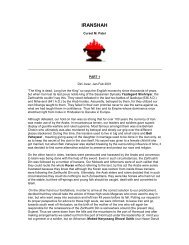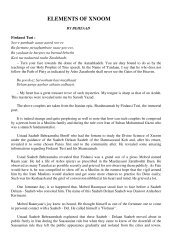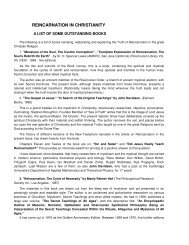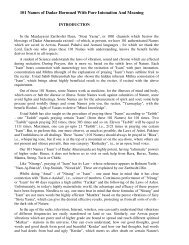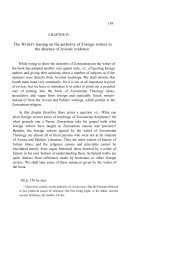Acceptance – Never Ever. - Traditional Zoroastrianism: Tenets of the ...
Acceptance – Never Ever. - Traditional Zoroastrianism: Tenets of the ...
Acceptance – Never Ever. - Traditional Zoroastrianism: Tenets of the ...
You also want an ePaper? Increase the reach of your titles
YUMPU automatically turns print PDFs into web optimized ePapers that Google loves.
Yet ano<strong>the</strong>r pro<strong>of</strong> that <strong>the</strong> term "Parsee" was used not only in <strong>the</strong> ethnic sense but in <strong>the</strong><br />
religious sense in ancient Iran, i.e. before <strong>the</strong> Zoroastrians emigrated to India, is to be found in <strong>the</strong><br />
Pahlavi texts, Karnaamak i Artakshir i Papakan ("A History <strong>of</strong> Ardeshir Papak", <strong>the</strong> founder <strong>of</strong> <strong>the</strong><br />
Sassanian Empire - 226-242 A.D.) and Drakht-i-Asurik ("The Assyrian Tree"). In <strong>the</strong> former text,<br />
Artakshir has been categorically referred to as, Khvataye Parsikan = <strong>the</strong> King <strong>of</strong> <strong>the</strong> Parsees".<br />
“After <strong>the</strong> downfall <strong>of</strong> <strong>the</strong> Sassanian Empire and <strong>the</strong> Arab conquest <strong>of</strong> Iran, <strong>the</strong> term 'Parsi'<br />
was used for those residents <strong>of</strong> Iran who remained faithful to <strong>the</strong>ir ancestral faith, namely Zoroastrian<br />
Religion. The term was specially used for <strong>the</strong> Zoroastrians <strong>of</strong> Iran to distinguish <strong>the</strong>m from those<br />
Iranians who discarded <strong>the</strong>ir ancestral faith and embraced Islam" Dastur Dr. H.K. Mirza.<br />
Thus, no amount <strong>of</strong> dialectical chicanery on <strong>the</strong> part <strong>of</strong> some Parsee intellectuals can erase <strong>the</strong><br />
inexorable facts <strong>of</strong> history and religious, semi-religious texts that Only a Maazdayasni, born <strong>of</strong> both<br />
Parsee parents can be a practising Zoroastrian. It is, <strong>the</strong>refore, stupid to talk <strong>of</strong> a "Christian Parsi" or a<br />
"French Zoroastrian" ! In o<strong>the</strong>r words, <strong>the</strong> Zoroastrian Religion has been, for millennia, <strong>the</strong> exclusive<br />
preserve <strong>of</strong> <strong>the</strong> Parsees, who include <strong>the</strong> Irani Zoroastrians.<br />
A short note here on that cause celebre, Petit vs. Jeejeebhoy will not be out <strong>of</strong> place. This<br />
notorious suit, that has proved to be <strong>the</strong> harbinger <strong>of</strong> <strong>the</strong> veritable ruin <strong>of</strong> <strong>the</strong> Parse community, has<br />
been <strong>of</strong>ten cited by those who advocate conversion or "mixed" marriages or Juddin Navjotes and by<br />
those who vainly labour to show <strong>the</strong> difference between a "Parsee" and a "Zoroastrian". And yet, <strong>the</strong><br />
historic judgement <strong>of</strong> Davar J. and Beaman J. does not at all deal with <strong>the</strong> last two factors, and<br />
negatives <strong>the</strong> first factor !<br />
In "The Parsi Panchayat Case", <strong>the</strong>re were only two issues before <strong>the</strong> Court: (1) Whe<strong>the</strong>r <strong>the</strong><br />
defendants were properly appointed trustees <strong>of</strong> <strong>the</strong> Bombay Parsi Punchayat; and (2) whe<strong>the</strong>r <strong>the</strong><br />
French wife <strong>of</strong> Mr. Tata was entitled to <strong>the</strong> religious institutions and funds managed by <strong>the</strong> Trustees.<br />
There was no third issue. The answer to <strong>the</strong> second issue was given in <strong>the</strong> negative !<br />
All <strong>the</strong> o<strong>the</strong>r statements and <strong>the</strong> opinions <strong>of</strong> <strong>the</strong> two learned judges were mere obiter dicta.<br />
Such judicial pronouncements do not have <strong>the</strong> binding force <strong>of</strong> law. They are not at all legal<br />
propositions.<br />
In this chapter, <strong>the</strong> point emphasised is that <strong>the</strong> term "Parsee" has been used thousands <strong>of</strong><br />
years before our ancestors landed in India and that whatever has been stated in <strong>the</strong> Davar - Beaman<br />
judgment regarding <strong>the</strong> difference between a "Parsee" and a "Zoroastrian" is mere obiter dicta. The<br />
opinion expressed in <strong>the</strong> suit that "Parsee" is only an ethnic term and not a religious one is <strong>the</strong> result<br />
<strong>of</strong> <strong>the</strong> woefully poor evidence <strong>the</strong>n submitted by <strong>the</strong> defendants in <strong>the</strong> Court !<br />
21


